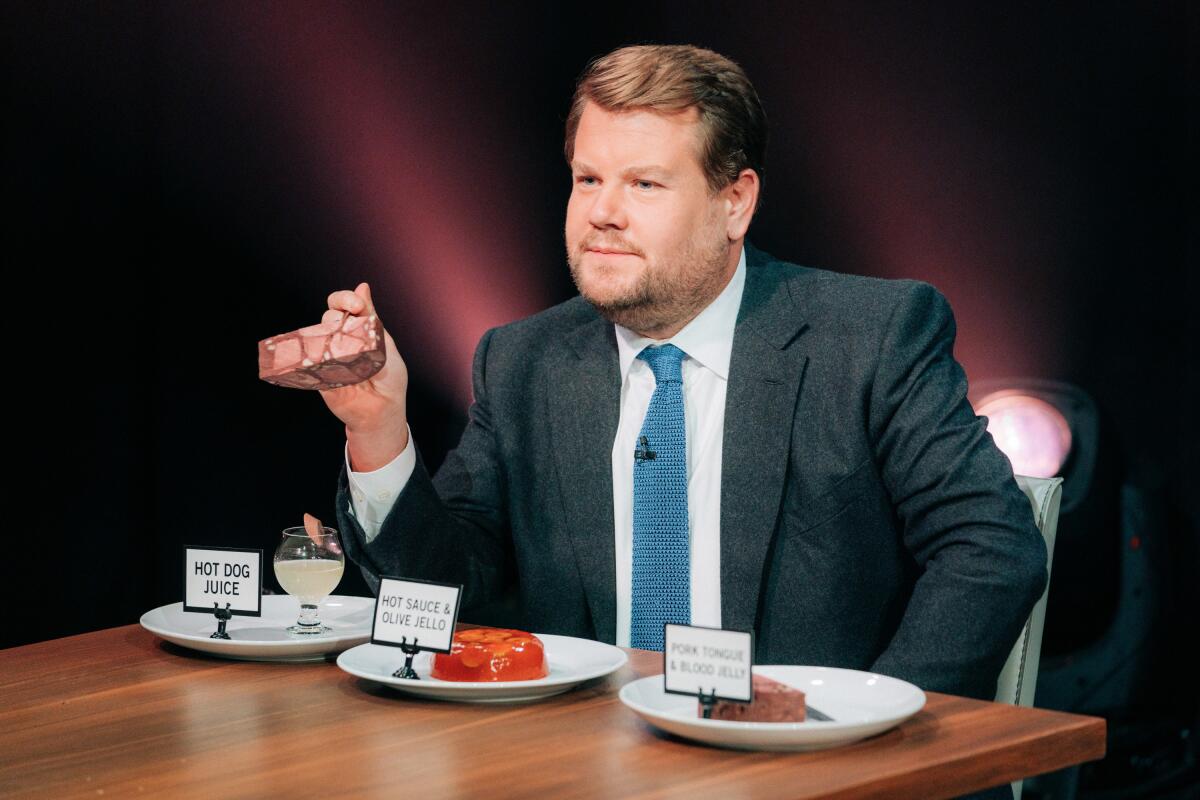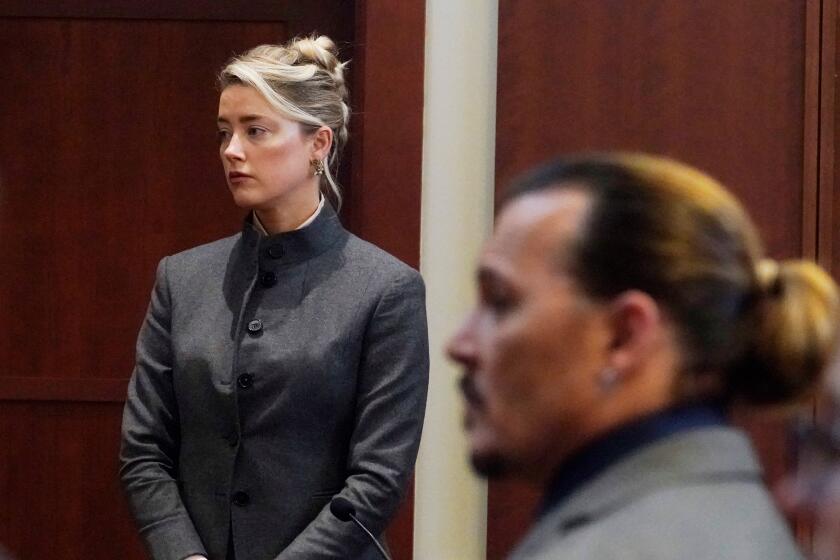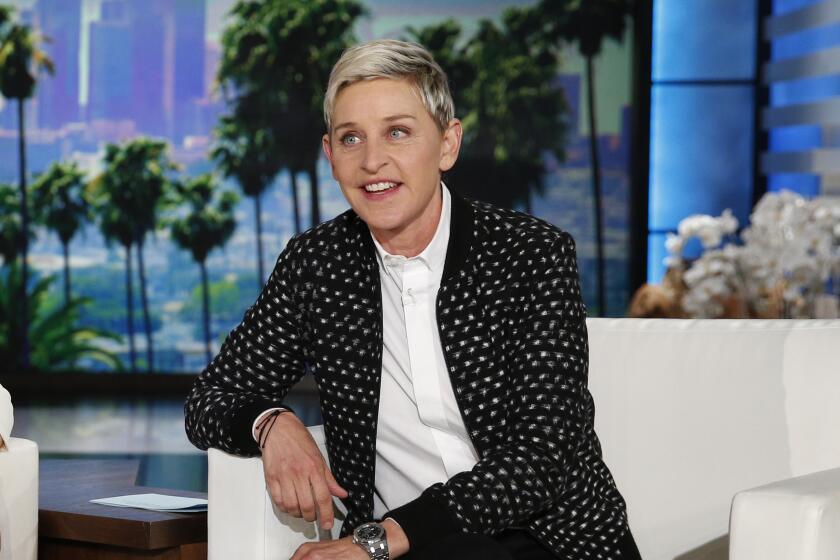James Corden is out, Anne Hathaway is in. But the biggest hypocrite is us

- Share via
James Corden and Anne Hathaway are both having moments. At first glance, they appear to be very different types of moments — Corden revealed as a jerk, Hathaway a hero — but they are really two sides of the same problem: the whims of a public that demands authenticity while too often accepting artifice.
Corden, who in 2014 leveraged his jolly “just love you” persona to replace Craig Ferguson on “The Late Late Show,” became the latest performer to have his nice-guy persona publicly shredded (see also: Ellen DeGeneres) when he was recently banned from elite-meet eatery Balthazar by its owner, Keith McNally, who admonished Corden for abusing wait staff on two occasions and generally revealing himself to be “a tiny Cretin of a man.”
Corden subsequently apologized and McNally lifted the ban, but not before plenty of other folks posted other alleged examples of Corden’s rude or arrogant behavior, bolstering years-long rumors that his niceness is not so much a brand as an act.
Hathaway, meanwhile, used her speech at Elle magazine’s recent Women in Hollywood event to push back on years of “Hathahate.” Recall that in 2013, many bloggers, social media users and culture critics reacted to her Oscar win for “Les Misérables” by labeling her “annoying” for being an ambitious actor with a very pretty face who seemed … too nice?
Like Tracy Flick, Hathaway spent a few terrible years as the young woman everyone loved to hate.
No matter how one feels about “Les Miz,” or even Hathaway’s performance in it, the vitriol she faced for working hard and being happy in her chosen profession is both unpardonable and symptomatic of a greater problem. Which Hathaway addressed with the Elle speech. Self-hate, she said, is something women are too often taught at a very young age, and “when your self-inflicted pain is suddenly somehow amplified back at you at, say, the full volume of the internet … It’s a thing.”
If Johnny Depp sued Amber Heard for defamation just to prove that there are people who still think he’s a big movie star, he’s won. But at what price?
Hathaway has never shied away from addressing this troubling time in her life; she has even done it with Corden. In 2016, when trading insults with him on a “Late Late Show” rap battle segment, she rapped: “I was hated and shaded but now I’m liberated, there’s nothing you can say to leave me incapacitated I’ve heard everything man, none of it broke me.” (She won that moment too.)
The #MeToo movement has seen the fall of so many “nice” guys — including Matt Lauer, whom Hathaway effectively shut down when he made a leering comment about a revealing paparazzi photo of her — that we have become more receptive to Hathaway’s message. More women, and men, have come forward to share how public perception can be manipulated to devastating effect. Like the terrible revelations of the Britney Spears case, Hathaway’s experience seems a bit distant, but 10 years do not make their stories less relevant.
We still love to be dazzled by stars, demanding endless images of their groomed-flawless features and figures, wanting to know what they think/pray/love, until something happens and we decide this one’s too fake, that one’s too full of herself, too distant, too over-exposed.
Sexism has fueled some of these popularity U-turns, but not all. A recent New Yorker profile of Jeremy Strong seemed determined to find eccentricity in the actor’s dedication to craft, just as so many people with public platforms voiced their often indefinable irritation with Hathaway’s.
The fact that Strong, Hathaway and most celebrities are simply trying to do their jobs in the way they and/or the industry think is best almost never comes into it.
Likewise, ever since Hollywood was dug out of the scrubland, we have craved reports of outrageous privilege from the rich and famous and rarely thought about the impact this behavior had on the people around them. A whole subset of reality television rose on the “entertainment value” of people verbally (and sometimes physically) abusing each other.
What the talk show host said in Thursday’s exit interviews only prolonged the controversy around her, raising the question: What will she do next?
In real real life, however, Hollywood — and the culture in general — has grown far less tolerant of the abusive behavior it once equated with success. The tantrum-throwing-mogul model that allowed the rise of predators like Harvey Weinstein and Randall Emmett and bullies like Scott Rudin is being dismantled one revelatory story and social media post at a time.
Too often referred to as “cancel culture” (for the record, Hathaway continued to work, and Corden will remain star of “The Late Late Show” until his previously announced 2023 departure date), a new social-media-fueled vigilance, sometimes just and sometimes petty, has zeroed in on gaps between public personas and private actions. Post #MeToo, we are all hypocrisy hunters, calling out the stars who speak out about climate change while racking up thousands of personal-jet miles; the “relatable” celebrities whose lives bear no resemblance to ours and especially the “nice guys” who turn out to be not so nice.
Corden’s news turned popular attention briefly from Jason Sudeikis, another star who has traded on his affability both on and off screen. Yet even as “Ted Lasso” marked the return of a kinder, gentler comedy, its star was embroiled in an ugly breakup. Sympathy first went to Sudeikis, who appeared to have been abandoned by longtime partner Olivia Wilde for pop star Harry Styles after Styles began filming “Don’t Worry Darling,” which Wilde directed. But recent revelations from the couple’s former nanny put Sudeikis in a less favorable light. Among other things, the nanny claims that when he discovered she was communicating with Wilde, the mother of the children she was caring for, he fired her. (Both Sudeikis and Wilde deny this.)
Not so nice.
No one expects Sudeikis, Corden or any celebrity to be as amiable and generous as they appear when hosting a television show or accepting an Emmy (and few of us are kind while in the middle of a contentious breakup). But abusing wait staff and nannies, or any other of the many service employees who cater to the better off, is not a good look for anyone; for Mr. Affability, it’s image-shattering.
It’s also very stupid: Do they think, in this age of social media, these incidents will go unreported?
Hollywood has long rewarded, even encouraged, monstrous behavior. And the bullies won’t be stopped until the mythmaking around them stops.
That all of this is happening in a culture currently obsessed with “authenticity” is fairly ironic. Corden’s nice-guy act, especially as a chaser to Ferguson’s bracing skepticism of the industry, was always too good to be true; the reaction to his brief exile from Balthazar seemed more like grateful glee than shock.
So maybe it’s time to decide what we really want from our celebrities. If we’re looking for archetypes — the nice guy, the troubled ingenue, the maverick, the diva — then we need to concede the level of fiction required to sustain these narratives.
If we prefer authenticity, as we so often claim, then we have to let the labels go and take what we get. People are complicated; success, wealth, fame and influence can make them even more complicated. By definition, what celebrities offer the public is some version of a persona, whether groomed for Instagram or presented on a talk show. If we’re going to be outraged when those images are proved sincere, like Hathaway’s, and hypocritical, like Corden’s, the problem isn’t with them — it’s with us.
That said, only a jackass yells at a restaurant server, so here’s hoping Anne Hathaway is a good tipper.
More to Read
The biggest entertainment stories
Get our big stories about Hollywood, film, television, music, arts, culture and more right in your inbox as soon as they publish.
You may occasionally receive promotional content from the Los Angeles Times.













